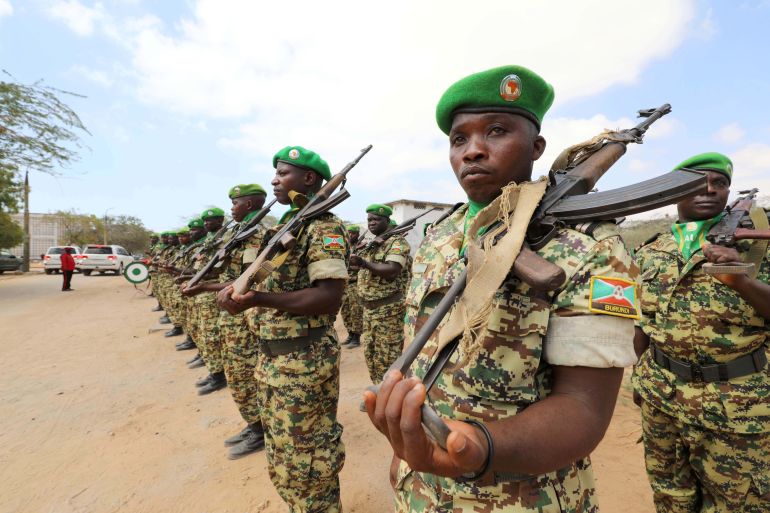UN authorises new AU mission in Somalia to dislodge armed groups
Somalia has begun to find its footing after three decades of chaos unleashed by strongmen and various armed groups.

The United Nations Security Council has voted unanimously to endorse the African Union’s new transitional mission in Somalia and authorised it to take action against al-Qaeda and armed groups allied to the ISIL (ISIS), as well as to conduct a phased handover of security responsibilities to Somalia’s government.
Thursday’s vote replaces the AU Mission in Somalia (AMISOM), which has been in the Horn of Africa nation for 15 years trying to build lasting peace and security, with the AU Transitional Mission in Somalia (ATMIS).
Keep reading
list of 4 itemsRecognition of Palestinian statehood is not the panacea it’s made out to be
UN peacekeepers close base in preparation to leave DR Congo
How can we reduce global food insecurity?
The resolution adopted by the council recognises significant changes in the security situation since it authorised AMISOM in February 2007 and improvements in Somalia’s capability to respond to security challenges, but also reaffirms “the need to combat terrorist threats by all means”.
In recent years, Somalia has begun to find its footing after three decades of chaos from strongmen to the al-Qaeda-linked al-Shabab group and the emergence of ISIL-linked armed groups.
Last year, a political crisis further postponed long-delayed parliamentary elections which were to be completed on March 15 are still not complete, further delaying the vote for a new president.
The British-drafted resolution authorises the new ATMIS mission to support the Somali forces “in providing security for the political process at all levels”.
The Security Council underscored that completing the electoral process without further delay and achieving “a peaceful transition of power” will help Somalia move ahead with its national priorities and support its 2021 transition plan which outlines steps towards the gradual handover of responsibilities for security from international forces to the government.
The council reiterated its objective “of enabling Somalia to take full responsibility for its own security, including through assuming the leading role in countering and addressing the threat posed by al-Shabab”.
The council authorised AU member nations to deploy up to 19,626 uniformed personnel, including a minimum of 1,040 police, until December 31. It also endorsed the AU Peace and Security Council’s decision to reduce the peacekeeping forces’ numbers by 2,000 by that date and “zero personnel” by the end of December 2024.
The resolution also welcomed the Somali government’s intention to create 3,850 additional positions for security personnel by December 2022, 8,525 more by September 2023 and an additional 10,450 by June 2024.
US Deputy Ambassador Richard Mills said the resolution “provides a vital opportunity to build on AMISOM’s efforts and take the next steps to roll back al-Shabab”.
“The ATMIS mandate provides the opportunity to adapt and reinvigorate the African-led, international effort against al-Shabab,” Mills said.
Somalia’s UN Ambassador Abukar Osman expressed disappointment that the council’s resolution did not provide more funding for its security forces or address the need for a unified and centralised command for ATMIS and greater logistical support.
Addressing these issues will ensure that the resolution is aligned with Somalia’s strategic document on security, he said.